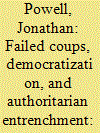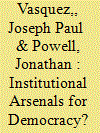|
|
|
Sort Order |
|
|
|
Items / Page
|
|
|
|
|
|
|
| Srl | Item |
| 1 |
ID:
115728


|
|
|
|
|
| Publication |
2012.
|
| Summary/Abstract |
Previous studies have attested to leaders "coup-proofing" their regimes by reducing the ability or disposition of their armies to seek their removal. The following article tests the utility of these efforts. "Structural" coup-proofing such as counterbalancing is expected to reduce the ability to organize a coup plot by creating substantial coordination obstacles to soldiers. Coup-proofing by spoiling militaries with organizational resources is expected to reduce the willingness to intervene. However, increased organizational resources are expected to increase the army's capabilities, thereby increasing the likelihood of a coup's success. The theory is empirically tested using a selection model with a global sample from 1961 to 2000. Findings suggest that both coup-proofing strategies are effective deterrents of coup activity and, more generally, that characteristics of the military appear to be far more important than economic influences on coups.
|
|
|
|
|
|
|
|
|
|
|
|
|
|
|
|
| 2 |
ID:
165972


|
|
|
|
|
| Summary/Abstract |
Long maligned as the largest threat to democratization, recent studies have suggested that military coups can act as important windows of opportunity for democratization in authoritarian regimes. It is argued that even failed coup attempts can roughly double the probability that an authoritarian regime democratizes in the next three years. We revisit these findings by assessing each case of a democratic transition occurring in a failed coup spell in Africa, using the standards of prior work. Our analysis points to a more pessimistic view of the influence of failed coups. Specifically, we find that the nature of these transitions, often being drawn out over several years, and the nature of the data previously utilized to test the association undermine the ability to observe a democratizing effect. Instead of failed coups providing a significant boost to democratization, we find they are more likely to reinforce the country’s previous political trajectory. Failed coups serve incumbents with the dual benefit of both outing their opponents and providing a pretext for their removal, ultimately providing a policy boost for both democrats and autocrats.
|
|
|
|
|
|
|
|
|
|
|
|
|
|
|
|
| 3 |
ID:
166691


|
|
|
|
|
| Summary/Abstract |
Recent years have seen increased scholarly attention given to the issue of child soldiering. Primarily dedicated to the decision-making calculus of rebel groups, this body of work has generally emphasised supply-side versus demand-side arguments. We contribute to this growing literature by explicitly investigating a previously untested aspect of the latter. Prior scholarship has made vague references to a potential association between economic endowments and child soldiering, including natural resource wealth, but scant empirical attention has been given. We argue that the specific type of endowment has important consequences for the decision to utilise child soldiers. We argue access to and exploitation of lootable natural resources (e.g. gemstones) to be especially likely to promote the use of child soldiers due to their ease of access, the low skills required to harness them and the heightened likelihood that groups will become more profit-oriented. A systematic cross-national investigation of rebel groups provides robust evidence that lootable resources such as diamonds and gemstones are strongly associated with the use of children, while non-lootable resources such as oil are not.
|
|
|
|
|
|
|
|
|
|
|
|
|
|
|
|
| 4 |
ID:
178246


|
|
|
|
|
| Summary/Abstract |
Recent years have seen increased study of military coups. While this generally emphasizes coups as a dependent variable, there is a growing debate as to how coups influence a country’s long-term political trajectory. This literature includes a handful of studies that claim coups against authoritarian regimes can act for the public good and provide a boost to the state’s democratization prospects. Causal mechanisms have included factors such as aid conditionality, economic interdependence, and foreign pressure more generally. We argue that this growing body of work can benefit from increased attention given to those who carry out coups: the armed forces. Specifically, we argue that coups reflecting a larger societal interest, be it the removal of a dictator or the desire for democracy after a dictator’s ouster, are more likely undertaken by conscript armies. A cross-national exploration of over 170 coups suggests that conscript militaries are in fact significantly more likely to oversee democratic transitions following military coups. Beyond contributing to a broader literature on civil–military relations, the article points to important policy implications for developing nations.
|
|
|
|
|
|
|
|
|
|
|
|
|
|
|
|
| 5 |
ID:
146924


|
|
|
|
|
| Summary/Abstract |
The capitalist peace thesis argues transnational economic ties have a pacifying effect on interstate relations. An extension of this literature reports that economic ties can prompt belligerents in civil conflicts to peacefully resolve their disputes and can attract third-party intervention from states with strong economic ties. This pacifying effect of economic ties, we argue, is applicable in the context of coups d’état: as a state becomes more economically interdependent with the rest of the world, the opportunity costs of domestic political disturbances are raised for both the targeted state and its financial partners. These costs – potential economic losses and a damaged economic reputation – influence belligerents in the state to use constitutional means to resolve their disputes while providing stronger incentives to foreign economic partners to influence the calculus of these belligerents as they consider the coup attempt. We test this argument quantitatively by investigating the influence of a dozen indicators of economic openness on coups in a global sample of states from 1952 to 2007. Our findings demonstrate the applicability of the capitalist peace thesis to coups d’état, manifestations of political uncertainty that are less likely to be accompanied by substantial loss of life or destruction of infrastructure.
|
|
|
|
|
|
|
|
|
|
|
|
|
|
|
|
| 6 |
ID:
163574


|
|
|
|
|
| Summary/Abstract |
It is paradoxical that authoritarian leaders often hold power for long periods of time, despite their states being plagued with rebellion. Scholarship has argued the practice of coup-proofing is potentially responsible for this trend. However, though regular armed forces are often allowed to whither when coup-proofing, states often retain substantial capabilities in the form of well-armed and well-trained coup-proofing units. This article argues that coup-proofing is more likely to contribute to rebellion when leaders are hesitant to deploy their coup-proofing units: when coup risk is high. Using a global sample of authoritarian regimes for the years 1971–2011, tests indicate that heavily coup-proofed regimes do in fact see a considerable increase in civil war likelihood when the risk of a coup is high but see no change in conflict propensity when coup risk is low.
|
|
|
|
|
|
|
|
|
|
|
|
|
|
|
|
|
|
|
|
|